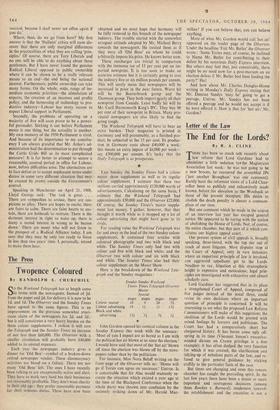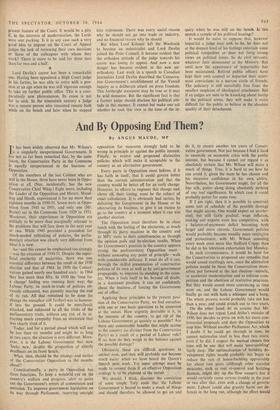Letter of the Law
The End for the Lords?
By R. A. CLINE HERE has been so much talk recently about 'T
1, law reform that Lord Gardiner had to administer a little sedation tos the Magistrates Association last week: he was not going to be a new broom, he reassured the assembled JPs ('just another Brougham' was one comment). Rarely have the reformist views of a Loid Chan- cellor been so publicly and exhaustively made known before his elevation to the Woolsack as those of the present occupant. His desire to abolish the death penalty is almost a common- place of our time.
But one comment which he made in the course of an interview last year has escaped general notice. He appeared to be toying with the notion of abolishing the House of Lords. Not, of course, the entire chamber, but that part of it which con- stitutes our highest appeal court.
Our present system of civil appeals is, broadly speaking, three-tiered, with the top tier out of reach of most litigants. Most disputes stop at the Court of Appeal; only in rare instances, where an important principle of law is involved, can aggrieved appellants get to the Lords. Needless to say, litigation at this stratospheric height is expensive and meticulous; legal prin- ciples are investigated with exhaustive and almost scholarly care.
Lord Gardiner, has suggested, that in its place a strengthened Court of Appeal, composed of five judges instead of the usual three, could revise its own decisions where an important question of principle is concerned. It will be interesting to see what the proposed Law Reform Commissioners will make of this suggestion; the abolition of the Lords would be greeted with mixed feelings by lawyers and politicians. The Court has had a comparatively short but chequered history. It has borne some ugly off- spring in its time (Viscount Simon's executive- minded dictum on Crown privilege is a fine example); it has often dodged the very function for which it was created, the clarification and tidying-up of nebulous parts of the law, and re- fused to give general guidance by sticking stuffily to the particular facts of the case.
But times are changing and even this remote chamber has caught the prevailing spirit. In the last few years there have been a dozen or more important and courageous decisions (among them Rookes v. Barnard); tenderness towards the establishment and the executive is not a present feature of the Court. It would be a pity if, in the interests of modernisation, the Lords were sent packing. Is it in any case such a very good idea to impose on the Court of Appeal judges the task of reviewing their own decisions or those of the colleagues with whom they work? There is more to be said for three tiers than for two and a half.
Lord Devlin's career has been a remarkable one. Having been appointed a High Court judge in his forties, he was able to retire with a pen- sion at an age when he was still vigorous enough to take on further public office. This is a com- paratively new phenomenon. Its cause is not far to seek. In the nineteenth century a judge was a remote person who remained remote both while on the bench and later when he stepped into retirement. There was every social reason why hc should not go into trade or industry, and no financial reason why he should.
But when Lord Kilmuir left the Woolsack to become an industrialist and Lord Devlin joined the Press Council, it became evident that the orthodox attitude of the judge towards his career was losing its appeal. And now a new danger has become evident in the new un- orthodoxy. Last week in a speech to Canadian journalists Lord Devlin described the Conserva- tive Government's establishment of the Vassall inquiry as a deliberate attack on press freedom. This forthright statement may be true or it may be wild nonsense. But the significant fact is that a former judge should disclose his political atti- tude in this manner. It cannot but make one ask whether he took this view at the time of the in-
quiry when he was still on the bench. Is this speech a sample of his political leanings?
It would be naïve to suppose that, however impartial a judge may seek to be, he does not at the deepest level of his feelings entertain some political sympathies or does not form strong views on political issues. So do civil servants, whatever their demeanour at the Ministry. But until now the appearance of impartiality has been maintained. Retired public officers have kept their own counsel or imparted their inner- most convictions to a narrow circle of friends. The judiciary is still mercifully free from the smallest suspicion of ideological attachment. But if ex-judges are seen to be knocking about lustily in the political arena, they will make it more difficult for the public to believe in the absolute quality of their detachment.



































 Previous page
Previous page